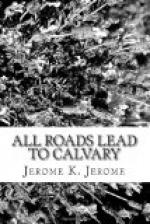She could still see him: the boyish smile. And his voice that had sent her tears back again as if at the word of command.
She hoped he had not seen them. What a little fool she was.
A little laugh escaped her.
CHAPTER VI
One day Joan, lunching at the club, met Madge Singleton.
“I’ve had such a funny letter from Flossie,” said Joan, “begging me almost with tears in her ink to come to her on Sunday evening to meet a ‘gentleman friend’ of hers, as she calls him, and give her my opinion of him. What on earth is she up to?”
“It’s all right,” answered Madge. “She doesn’t really want our opinion of him—or rather she doesn’t want our real opinion of him. She only wants us to confirm hers. She’s engaged to him.”
“Flossie engaged!” Joan seemed surprised.
“Yes,” answered Madge. “It used to be a custom. Young men used to ask young women to marry them. And if they consented it was called ’being engaged.’ Still prevails, so I am told, in certain classes.”
“Thanks,” said Joan. “I have heard of it.”
“I thought perhaps you hadn’t from your tone,” explained Madge.
“But if she’s already engaged to him, why risk criticism of him,” argued Joan, ignoring Madge’s flippancy. “It’s too late.”
“Oh, she’s going to break it off unless we all assure her that we find him brainy,” Madge explained with a laugh. “It seems her father wasn’t brainy and her mother was. Or else it was the other way about: I’m not quite sure. But whichever it was, it led to ructions. Myself, if he’s at all possible and seems to care for her, I intend to find him brilliant.”
“And suppose she repeats her mother’s experience,” suggested Joan.
“There were the Norton-Browns,” answered Madge. “Impossible to have found a more evenly matched pair. They both write novels—very good novels, too; and got jealous of one another; and threw press-notices at one another’s head all breakfast-time; until they separated. Don’t know of any recipe myself for being happy ever after marriage, except not expecting it.”
“Or keeping out of it altogether,” added Joan.
“Ever spent a day at the Home for Destitute Gentlewomen at East Sheen?” demanded Madge.
“Not yet,” admitted Joan. “May have to, later on.”
“It ought to be included in every woman’s education,” Madge continued. “It is reserved for spinsters of over forty-five. Susan Fleming wrote an article upon it for the Teacher’s Friend; and spent an afternoon and evening there. A month later she married a grocer with five children. The only sound suggestion for avoiding trouble that I ever came across was in a burlesque of the Blue Bird. You remember the scene where the spirits of the children are waiting to go down to earth and be made into babies? Someone had stuck up a notice at the entrance to the gangway: ‘Don’t get born. It only means worry.’”




